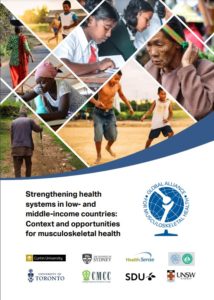Strengthening health systems for musculoskeletal health in low and middle-income countries
The burden of disease attributed to musculoskeletal (MSK) conditions disproportionately affects people in low- and middle-income counties (LMICs). This is attributed to a confluence of factors including increasing prevalence of MSK health conditions with a more rapidly ageing population, population growth and more restricted access to effective prevention and control interventions. While health systems strengthening responses to arrest the burden attributed to MSK impairment are emerging in high income settings, with global-level guidance is now also available, these strategies may not necessarily be transferable to LMICs.
Supported by funding from the Bone and Joint Decade Foundation, Canadian Memorial Chiropractic College, Curtin University (Australia) and Institute for Bone and Joint Research (Australia), an international team of researchers re-evaluated data from the GMUSC global strategy report to identify priorities and opportunities for health systems strengthening for MSK health in LMICs. They undertook secondary analysis of qualitative data to specifically interrogate themes relevant to context and priorities for MSK health system reform in LMICs and coupled these data with analysis of health polices for integrated management of non-communicable diseases. The team examined data from nine LMICs: Argentina, Bangladesh, Brazil, Ethiopia, India, Kenya, Malaysia, Philippines and South Africa.
The findings of that work are presented in this report, accompanied by a research paper published in the journal Health Policy and Planning.
